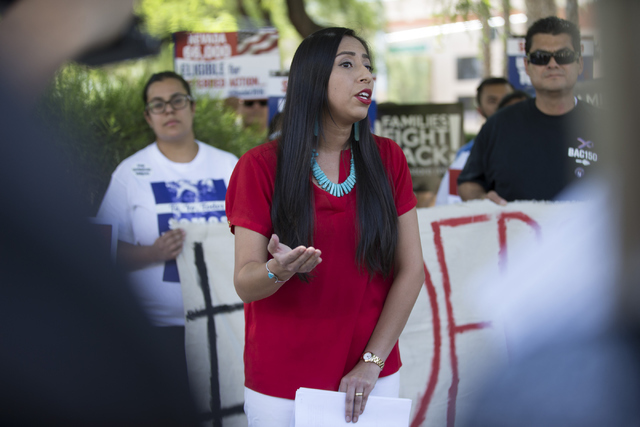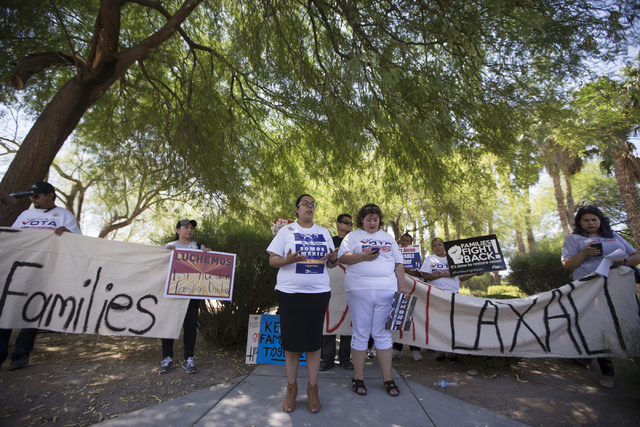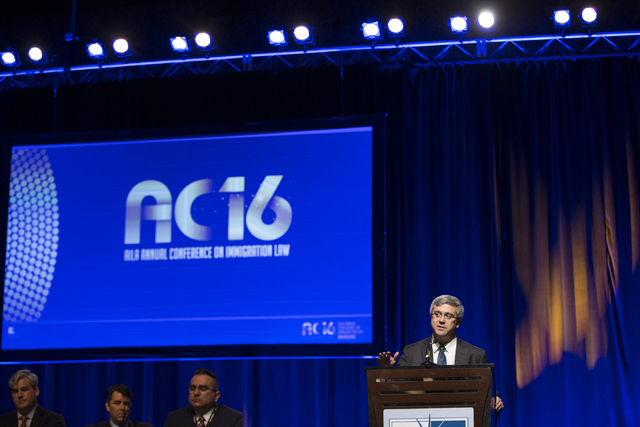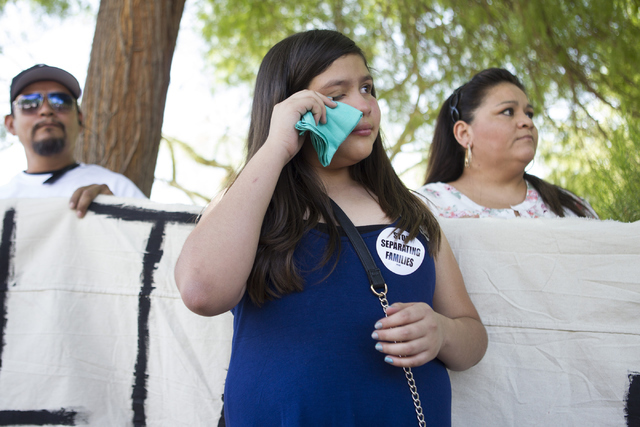Supreme Court tie vote blocks Obama’s immigration plan
The U.S. Supreme Court on Thursday dashed the hopes of thousands of Nevada immigrants who qualified for deportation relief and work permits through a federal immigration plan.
After the justices tied 4-4 in a case involving President Barack Obama’s 2014 executive orders, local immigration advocates and their families vowed to respond at the polls in November. In a separate case, the court upheld a University of Texas program that takes account of race in deciding whom to admit, an important national decision that was cemented by the death of Justice Antonin Scalia.
Because the high court couldn’t agree on the immigration plan case, a lower court’s ruling blocking Obama’s executive actions remains in place, putting an indefinite freeze on what the White House had hoped would be the heart of the president’s legacy on immigration.
The justices issued a one-sentence opinion. The tie vote sets no national precedent but leaves in place the ruling by the lower court. In this case, the federal appeals court in New Orleans said the Obama administration lacked the authority to shield up to 4 million immigrants from deportation and make them eligible for work permits without approval from Congress.
Texas led 26 Republican-dominated states — including Nevada — in challenging the program Obama announced in November 2014. Congressional Republicans also backed the states’ lawsuit.
Obama sought to reassure millions of immigrants in the U.S. illegally that he has no plans to deport them, while acknowledging that the Supreme Court’s deadlock Thursday marks the end of the road for his push to reform the U.S. immigration system.
Though Obama predicted an immigration overhaul is inevitable, he conceded it won’t happen while he’s president due to opposition from the current Congress. Working to lay the groundwork for the next president to pick up the effort, he cast the election in November as a referendum on how the country would treat its immigrants.
“We’re going to have to make a decision about whether we are a people who tolerate the hypocrisy of a system where the workers who pick our fruit or make our beds never have the chance to get right with the law,” Obama said. “Or whether we’re going to give them a chance, just like our forebears had a chance, to take responsibility and give their kids a better future.”
Michael Kagan, associate professor of law and co-director of the Immigration Clinic at UNLV, said Thursday’s decision was a victory for the states that challenged but not a final one.
Because no precedent was set, a future president would have the option of revising the plan and eventually having it go before a nine-member Supreme Court, Kagan said.
“This is not the last word at all,” Kagan said.
Thomas A. Saenz, the attorney who argued the case before the U.S. Supreme Court in April on behalf of immigrant mothers, spoke about the court’s action Thursday at the annual American Immigration Lawyer’s Association conference in Las Vegas.
Saenz, president and general counsel for the Mexican American Legal Defense and Educational Fund, said the decision could spur people to action politically.
Talking to hundreds of immigration attorneys in attendance, Saenz said, “I do not think the 26 states and their leaders will be forgotten, because their actions in continuing this litigation, to this point and beyond, is not performing their duty to act in the best interests of their own residents.”
After the decision, about 25 people, many of them immigrants, gathered outside the Grant Sawyer Building, which houses the Las Vegas office of Nevada Attorney General Adam Laxalt.
Many of them were also members of immigrant advocacy groups including the Progressive Leadership Alliance of Nevada and America’s Voice.
Yovanna Ozuna, 10, who came with her mother, stood on a curb outside, crying.
“I’m scared that my mom and dad will leave me,” she said. “I’m the only one from my family that was born from here.”
Maria Espinosa, 50, said she has lived in the U.S. for 25 years and worked for much of that time as a baby-sitter. Espinosa, who has a 22-year-old U.S. citizen daughter, would have qualified for the immigration plan.
Espinosa cannot vote because of her status but said she would urge others to vote for presidential and local candidates who will support the Latino community.
“I’m going to motivate people to find out, who are those (candidates) who turned their backs on us in this,” Espinosa said.
In a statement Thursday, Laxalt, who signed Nevada onto the lawsuit last year, said the decision halted a presidential overreach and put the decision “back into its rightful place of Congress.”
“Hopefully this decision will yet again signal to this president that he cannot act unilaterally within our constitutional system simply because Congress in his view, ‘fails to act,’” Laxalt said.
According to the Migration Policy Institute, approximately 138,000 undocumented people live in Nevada. Of that population, about 51,000 people would have qualified for the 2014 immigration plan.
The decision also would have expanded a 2012 deferred action program designed to help undocumented youth brought to the U.S. as children. The program has had 13,485 initial applicants from Nevada as of March 2016, according to U.S. Citizenship and Immigration Services.
Erika Castro, 27, a community organizer with PLAN, is one of the youths who have benefited from the 2012 program created under executive order by Obama.
Castro said the program allowed her to find a higher-paying job and pay for college at the College of Southern Nevada, where she is studying political science.
U.S. citizen children of parents who would have qualified like her brother will respond by voting for candidates that sympathize with their situation, she said.
“And even me being undocumented, not being able to vote, I’m out there registering people to vote, I’m out there making sure the community is paying attention,” Castro said.
The Associated Press and Review-Journal writers Melissa Gomez and Tatiana Villamil contributed to this report. Contact Alexander S. Corey at acorey@reviewjournal.com or 702-383-0270. Find him on Twitter: @acoreynews



































